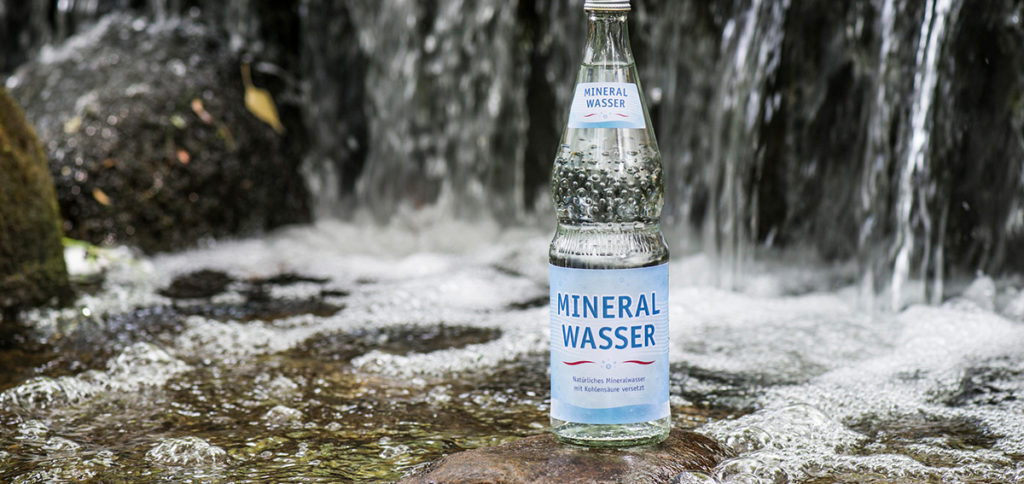Mineral water producers criticized

Mineral water is increasingly becoming a political issue. A bitter dispute has been raging for months about what was previously regarded as a completely “innocent” consumable. The main issue is the sustainability of mineral springs and mineral water producers.
Aldi Süd wants to score major points with the issue of “water.” During the final week of August the discounter ran a full two-page promotion in its circular for its “Sodastar” carbonator. Organic-certified “Rieser Urwasser” is scheduled to go on sale in 50 to 70 stores in September. Aldi is planning a marketing campaign to coincide with the launch. With this promotion, the company is embracing two trends, which could hardly be more contrasting. On one hand, a complete rejection of mineral water in favor of tap water, and on the other hand, tap water being touted as an ecologically exemplary lifestyle beverage.
At the end of November of last year Svenja Schulze, Federal Minister for the Environment, caused a real stir when announcing her “5-point plan for less plastic and more recycling”. She described the purchase of mineral water as “unnecessary” given the high quality of drinking water in Germany. The fact that utility companies are complaining more and more frequently about drinking water purification problems is simply not being considered. The media is full of reports about nitrates, pharmaceuticals, microplastics and other forms of contamination in tap water.
The European Parliament, in its recently revised EU Drinking Water Directive spoke out almost simultaneously – and unambiguously – for greater use of tap water, to reduce plastic waste and consumption. The target of this assault was not just the mineral water producers, who saw their business model being challenged, but also hospitality providers, who were called on to offer their guests tap water either free of charge or at a low charge.
According to the “Comparison of the Environmental Impact of Drinking Water vs. Mineral Water” survey, total consumption of tap water and mineral water surprisingly only accounts for less than 1 percent of overall environmental impact by households. In contrast, when consumption of hot water is involved, plenty of heating energy could be saved.
Sodastream accuses the mineral water companies of littering the environment

These attacks are not just being launched by politicians. Carbonator manufacturer Sodastream, in particular, has clear business interests at stake. With actor and environmental activist Hannes Jaenicke as its brand ambassador, it is aggressively promoting the discontinuation of mineral water consumption, specifically away from plastic bottles, and consequently associating the mineral water companies with littering the world’s oceans.
Stiftung Warentest recently took sides as well. In its June 2019 “Water Test”, less than half of the tested still mineral waters achieved a good result. There were reports of “unwelcome germs” and of increased “critical substance plus agricultural and industrial impurity” content. VDM, the mineral water industry association, in turn, accused the organization of “applying double standards” since the results obtained for both types of water were not based on systematically comparable methods. For example, tap water was not even analyzed for its health parameters.
The mineral water companies are aiming to defend themselves against more than just these accusations. A VDM delegation, headed by association chairman Dr. Karl Tack, is currently touring Germany and speaking with politicians and journalists in all regions of the country. The purpose is not just to oppose the Federal Ministry for the Environment’s “populist tokenism policies”, but most importantly to straighten out the facts.
This frequently includes the mistaken assumption that PET bottles from Germany are somehow involved in littering the oceans with plastic. This does not take into account the well-run deposit system and high rate of recycling. In fact, 97 percent of compulsory-deposit, non-reusable PET bottles are already recycled, according to a 2018 survey by the Gesellschaft für Verpackungsmarktforschung (GVM).
More and more consumers want organic mineral water
While more and more consumers are nevertheless switching to self-carbonated tap water, the demand for organic quality is increasing even outside of the committed green community. While small regional mineral water bottlers previously tended to sport the ‘Qualitätsgemeinschaft Bio-Mineralwasser’ seal, large well-known producers have recently been certified. For instance, Vilsa Brunnen and the Hövelmann beverages group joined recently – in July and August of this year.
Nevertheless, the issue of whether water is “always organic” has recently been debated in the industry. Mineral water is “naturally pure and can’t be any purer” is what, Franken Brunnen CEO, Michael Bartholl, believes. He fears that consumers could perceive this type of seal as “fake labeling.”

Given this growing interest, competition between inspection organizations is intensifying. For months, the courts have been addressing the question of whether the SGS Institut Fresenius’ Bio Seal is a bona fide seal of organic quality or just an inferior “pseudo seal of organic quality,” as the Qualitätsgemeinschaft Bio-Mineralwasser alleges. Fresenius unequivocally won its case at the Regional Court in Frankfurt/Main in early September, but the Qualitätsgemeinschaft has already announced that it is going to appeal.
If you take bio/organic seriously, you have to “defend bio/organic principles against attack and dilution,” the Qualitätsgemeinschaft’s chairman, Franz Ehrnsperger, explained in connection with the court case. One can’t “let oneself be intimidated, even by the big corporations.”
Once again, it boils down to “David versus Goliath.” The mineral water producers, irrespective of whether they are big or small, organic or conventional, should instead join forces to stand their ground against the emerging tap water lobby. This is where the real future enemy is to be found.
Anyone interested in technical background information relating to mineral water will find the right forum at drinktec, the world’s leading international industry trade fair taking place in Munich. Exhibitors from all over the world showcase their solutions here – from bottling plants to labeling machines. The next drinktec will take place from September 13 to 17, 2021.
